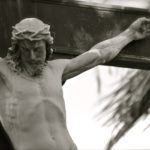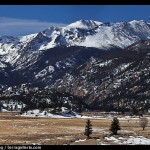He is risen! He is risen indeed!
Peter’s Story
Fear bred denial.
Denial gave way to loss.
Loss brought forth doubt, disillusionment, confusion.
Then, a glimmer of hope…but only a glimmer.
Mary came running, breathlessly exclaiming “I’ve seen the Lord!”
Could it be? Fear mingles now with a breath of hope, and suddenly, there he is! No turn of the key, no opening of the door – he’s just…there!
A greeting of peace; a cryptic breath about the Holy Spirit, and then…more waiting.
A day passes. Another. Six days, and we’re beginning to think it was just the shock of the crucifixion; that we hadn’t really seen him at all. But then again, just as before, he’s there with us!
Again, the greeting: “Peace be with you.” This time he focuses on Thomas, who didn’t believe we’d seen him – and whose doubt we were beginning to carry, to be honest with you. He invites Thomas to touch his scars; he holds his hands out to all of us, but we believe…at least, I think we do.
It’s been a while now, though. The days pass as in a fog. Was that it? Is it all over now? What happens next? What do we do?
We stayed in the house for a while – partly from fear of the Jews and the Romans, and partly because that’s where He has shown himself twice before. But as the days pass we’ve begun to venture out more. Finally the monotony is too much. We have to do something. I have to do something. “I’m going fishing.”
“We’ll go with you.”
Seven of us, fishermen all, prepare the boat. It feels good to be back on the water, back among the nets and ropes and smells that I grew up with. To hear the creak of the oars in their locks, the gentle lapping of the water at the hull.
But something doesn’t seem quite right. I’ve been in this boat a thousand times, spent hours beyond count on this very lake, but something’s different. Something’s wrong, but I just can’t put my finger on it.
The night – and the nets – drag on, each as empty as the other. Have the fish moved? Have I forgotten so quickly the best spots? We’ve tried the deeps and the shallows, the coves and the open waters, all to no avail. But the nagging sense that I – not just the boat, but I myself – am in the wrong place tempers what frustration I should be feeling at the futility of our night’s efforts.
And then, with a faint glimmer of sun barely visible over the low eastern hills, a voice comes from the near shore: “Children, do you have any fish to eat?”
“No.”
“Cast the net on the right side of the boat, and you will find some.”
There’s something familiar about that voice, those words. Too tired to argue, to hungry to not try, we haul in the empty nets from the port side and throw them to the starboard. Scarcely have they hit the water before they fairly drag the boat backward. Fish!
Straining against the sudden weight, John, always the perceptive one, always the first to recognize, identifies the stranger on the shore: “It’s the Lord!” he gasps.
With an eagerness that surprises even me, I grab my cloak and dive in, half swimming, half wading the hundred yards. I need to see him, to hold him, to have just two minutes alone with him. What will he say? The last time our eyes met was when that rooster crowed; in the house I couldn’t look at him, though I felt his gaze burning into my soul.
————————
Our Story
Denial. Doubt. Disillusionment.
They weigh us down like an anchor. In spite of our calling to something new, we retreat to the comfort of the old and familiar. But something doesn’t feel right anymore. If we’re lucky (or perceptive), we realize that we can’t go back. I remember the pain of that realization the Christmas after graduating from high school. Six months after leaving, I was back at home…and surprised to learn that life had gone on quite well without me.
But Peter’s absence wasn’t just from home or family or job. He had left those things three years earlier, but his triple denial had separated him even from the One for whom he had abandoned all.
The doubt and disillusionment may be with Jesus – or it may be with ourselves. Like Peter, our doubt may be about our own unworthiness to serve the master. Will he really accept me, after I denied him? Can he really forgive me?
But as with Peter, the master – Jesus – stands by the shore and calls to us. Hungry as we are for purpose and meaning and love, he waits for us with a warm fire and a meal of grace. Whether we dive in to get to him
or row patiently, ploddingly, he waits, ready.
No matter how – or how often – we have denied him, Jesus forgives.
It is not an easy forgiveness, for Jesus or for us. It cost him his life; it costs us our pride…and our lives, “For whoever would save his life will lose it, but whoever loses his life for my sake will save it.” (Lk 9:24)
And it is not a painless forgiveness, for Jesus or for us. He suffered untold horrors on his way to buying our redemption. For our part, we would just as soon move on from our denial – to leave it in the past and forget it there. But Jesus won’t allow that; as Michael Card writes:
Jesus is not only the perfect Savior; he is also the perfect Friend. And here he demonstrates perfectly what friendship entails. He has commanded [the disciples] to forgive; now he will perfectly demonstrate it. His painful questions are meant to restore Peter to his proper place. Painful as the questions are, they are an expression of Jesus’ creative forgiveness. Jesus’ questions open a wound in Peter’s soul, a wound that can be tended to and healed only by being reopened. (Michael Card, A Fragile Stone, pp. 124-5)
This morning as we celebrate Jesus’ resurrection, his victory over death, we also invite the pain of his healing forgiveness. As symbols of the pain he endured to purchase that forgiveness, we share together the bread and wine of communion, the Lord’s Supper.
“Do you love me more than these?”
Eat my body.
“Do you love me?”
Drink my blood.
“Do you love me?”
Follow me.
With each question, the surgeon’s knife cut more deeply into Peter’s pain.
With each answer, the infection of his denials is removed.
With each new commission, Jesus sutures the wounds, reassuring Peter – and us – of his forgiveness and acceptance.
Today, this Easter morning, accept Jesus’ forgiveness.
Today, join in the resurrection story by accepting the new life that only Jesus can offer.
 Jesus asked his disciples, “Who do people say that I am?” And they said, “Some say John the Baptist, others say Elijah, and others Jeremiah or one of the prophets.” (Matthew 16:13-14, ESV)
Jesus asked his disciples, “Who do people say that I am?” And they said, “Some say John the Baptist, others say Elijah, and others Jeremiah or one of the prophets.” (Matthew 16:13-14, ESV)

